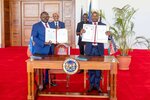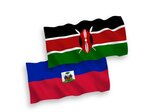

‘Hakuna Matata,’ the Swahili language term for ‘no worries,’ seemed to be the declaration of President William Ruto as he and Prime Minister Ariel Henry witnessed the signing of a reciprocal agreement between their respective nations, Kenya and Haiti on Friday, March 1, 2024. This agreement will allow Kenya to lead a United Nations-backed Multinational Security Support mission (MSS), which will see the posting of 1,000 Kenyan police personnel on Haitian soil.
‘Hakuna Matata,’ this Kenyan philosophical optimism made popular by the Walt Disney animation film Lion King, meaning ‘no trouble,’ ‘no worries,’ and ‘take it easy’ cannot and should not be applied to the Haitian crisis. Haiti is a nation under siege by an impoverished population, violent gangs, and weakened governing and security institutions since 2016. Most of the nation’s basic services are not functioning under pressure from the escalating gang violence and a succession of recent natural disasters.
The one thing all members of the United Nations agree with is that Haiti needs help. However, their reluctance to commit personnel to the mission is due to their realization that going into Haiti has multiple dangers that can get out of hand very quickly.
So why would Kenya wish to be involved in the MSS? Part of it has to do with what Haiti represents. Haiti is a physical and symbolic representation of African resistance, determination, resilience, and pride. It was the first nation to defeat a European colonial power, i.e., the French, in 1803. Haiti was inspirational for all African and Caribbean nations desirous of gaining independence. Haiti became the first Black republic in 1804 and was the first black nation to join the League of Nations, the precursor to the United Nations, in 1945. The overwhelming majority of Haitians are Africans who were transported to the Caribbean through the inhumane trafficking of African bodies, known as the Trans-Atlantic Slave Trade.
The stated goal of the United Nations MSS mission is to protect the Haitian population from extreme violence by gangs, strengthen the Haitian National Police, and protect key strategic infrastructure. This, it is believed will help to restore democratic institutions and constitutional order.
What would be critical for the success of the MSS and, therefore, the Kenyans is their respect for Haitian human rights, which are regularly violated through exploitation and sexual abuse, and the ensuring of accountability when those regulations are broken.
For now, the Multinational Security Support mission to Haiti conveys hope for the ordinary Haitians and a measure of stability. Much more would be required by the United Nations and the Haitian population and its diaspora if it is to develop into a stable country under its own sovereignty. Alongside Kenya, the Bahamas, Bangladesh, Barbados, Chad, and Benin have all pledged troops towards the mission.
Africa’s growing concern for Haiti was reflected in its humanitarian response to the 12 January 2010 earthquake. African nations responded unprecedently by pledging US$51 million to the relief effort. One of the relief initiatives was said to be the delivering ‘of a message from Mother Africa to her sons and daughters across the Atlantic. What is certain is that ‘hakuna matata’ may very well represent the best in African philosophical and philanthropic efforts, as reflected in the popular proverb ‘the load is lighter when two people carry it.’
Rev. Ronald A. Nathan is the Star of Zion’s World Politics Editor and Pastor of the Hoggard A.M.E. Zion Church, St. Michael, Barbados.
Comments
No comments on this item Please log in to comment by clicking here